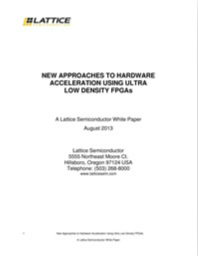NEW APPROACHES TO HARDWARE ACCELERATION USING ULTRA LOW DENSITY FPGAs
Ask system designers to list the problems they face – it doesn't matter whether they're building mobile consumer, automotive, industrial, medical or scientific applications – and inevitably they'll mention optimizing host processor performance. It's hardly surprising. The event-driven architecture of these MPUs allows them to multitask and address new priorities as they occur. But as the number of I/O continues to rise, it also places escalating demand on bandwidth.
Tasked with managing a wider array of I/O as well as other system-wide command and control functions, today's host MPUs must remain operational for longer periods of time, thereby consuming precious power and compute resources.
Download this whitepaper to learn more.
Read More
By submitting this form you agree to Lattice Semiconductor Corporation contacting you with marketing-related emails or by telephone. You may unsubscribe at any time. Lattice Semiconductor Corporation web sites and communications are subject to their Privacy Notice.
By requesting this resource you agree to our terms of use. All data is protected by our Privacy Notice. If you have any further questions please email dataprotection@techpublishhub.com
Related Categories: Automotive, Communication, Components, Displays, Embedded, Industrial, Motor control, Power, Processors

More resources from Lattice Semiconductor Corporation
PRACTICAL LOW POWER CPLD DESIGN
Any engineer involved with portable or handheld products knows that minimizing power consumption is an absolute requirement for today's designs. Bu...
SOLVING INTELLIGENCE, VISION & CONNECTIVITY CHALLENGES AT THE EDGE WITH ECP5™ FPGAs
This whitepaper will introduce the ECP5™ and LatticeECP3™ FPGAs as viable solutions to overcome embedded design co-processing and connectivity ...
2:1 MIPI CSI-2 Bridge Soft IP
In some cases, mobile Application Processors (AP) may not have enough interfaces to support the number of image sensor inputs required for a partic...
